- Home
- Linda Newbery
The Sandfather Page 10
The Sandfather Read online
Page 10
Soon as soon was one of the things she used to say when he was little. And Prince Hal! She’d said it again! He almost said, ‘I know why you call me that,’ but the words jammed in his throat, and all he managed was a strangled, ‘See you.’
He followed Aunt Jude back into the main aisle of the ward; he turned and saw Mum watching him, as if hanging on to the very last glimpse. Abruptly, embarrassingly, he felt as tearful as an infant. A big choking sob was building up in his chest; he could have cried, really cried, if he’d wanted to.
‘What you said - about something turning up? How can you be so sure?’ he asked Aunt Jude, to deflect attention. She wasn’t planning to open up a hairdresser’s just to give Mum a job, that was for sure.
‘I don’t know, yet,’ said his great-aunt. ‘But we’ll think of something. We’re family, and families help each other out.’
13
GLASS
Out in the garden, Aunt Jude was raking leaves and tidying. Hal, sure that she was safely occupied, was poring over the local telephone directory.
Priestman . . . Prill . . . Primrose . . . Prince.
There it was, springing out at him from the page.
Prince, W. 10 The Strand, Ryton-on-Sea. And the phone number.
Quickly he wrote it on a page torn from his rough book. He tucked the directory back into place on the shelf below the phone, and raced up to his room.
He’d rehearsed and rehearsed what to say, but still he hesitated. It would come out wrong, or his throat would clam up and he wouldn’t be able to speak at all. But he made himself do it. With a trembling finger he keyed in the number, and waited.
The ringing tone went on for a long time; he realised he was holding his breath. He felt ready to howl with frustration and sag with relief, both at once. Then came the click of someone picking up.
‘Yes?’ said a man’s voice - a cracked, out-of-breath voice, not Wesley’s.
‘Uh - I - is Wesley Prince there?’ Hal asked, remembering to add, ‘Please.’
‘No, no, no. This is Willard Prince,’ said the voice. ‘You want my son Wesley. He’s not here, he’s in Marine Terrace. This is who?’
‘Hal,’ said Hal, greatly daring.
‘OK then, Hal, here’s his number. You ready?’
Hal wrote it down, thanked the man, and rang off. Then he paused, realising what he’d just done. One brief phone call had given him not only Wesley’s phone number and address (though he’d forgotten to ask what number the house was) but also a grandfather. Not the miserable old man whose house this was, but a real, kindly-voiced grandfather. Jamaican, by his accent, the way his voice leaned into the words. Hal could almost picture him: stooped, with a lined face, and tightly curled hair gone iron grey with age. He’d have been sitting in his garden, or yard perhaps, reading the paper in the autumn sunshine. Or maybe he grew vegetables: Jamaican vegetables, red hot chilli peppers, in a greenhouse. Did he have a wife? If so, she’d be Hal’s grandmother. A whole family was making itself at home in his imagination.
Here was his missing half! The half he’d always missed, wondered about. Jamaican. He was part-Jamaican. And Wesley had more family there: Aunt Jude had said so, to Don. Visions of beaches and carnivals, sounds of drum-beat and rap music filled Hal’s mind. His. Part of him. He wanted to go there, see where he came from. See where that part of him belonged.
And now?
Instead of phoning, he’d go and find Wesley’s house. That shouldn’t be too difficult. Hal dipped his hand into the bag of marbles and probed with his fingers, choosing two by feel.
He’d pulled out two moon marbles, as he called them - the milky-white, swirly ones that seemed somehow mysterious. There were only two of those, so it seemed lucky to pick both. Could you make up your own superstitions? Maybe he’d know by the end of today. For now, he’d believe it meant good luck. He slipped the marbles into his jeans pocket.
Aunt Jude had said that he didn’t have to do schoolwork at the weekend, as long as all assignments were completed by Monday week. She was planning to take him out this afternoon, to Sea Life at Brighton, so he’d take his chance now.
‘I’m getting lunch early,’ she told him, when he said he was going out for a bit. ‘So make sure you’re back by twelve-thirty.’
No doubt she had a map of the town, but if he asked for it she’d want to know why. No prob - he’d ask someone the way. But as he walked along near Marborough’s he came across a town plan on a board, with YOU ARE HERE, and a red arrow pointing. An index at the bottom listed street-names: Marine Terrace was on the west side of town, one street up from the children’s playground. Quite a short street, it looked on the plan, so he should be able to find out which house was Wesley’s.
Five minutes later he was standing by a corner shop, with Marine Terrace stretching no more than two hundred metres in front of him. There were houses on one side of the street only, which made it easier; on the other, a steep bank with flowerbeds cut into it sloped down to the promenade, and the children’s boating-pool. The houses were three-storey, most of them tall and narrow, without gardens in front.
The shop was the kind that sold newspapers, drinks and ice-creams as well as packets and cans of food. There were a few customers inside, and an approachable-looking woman stood behind the counter, so Hal went in. A man with a spaniel was buying a Daily Express, and talking about the weather forecast; when he’d finished, Hal bought a can of Sprite and asked the woman if she knew where Wesley Prince lived.
‘Number fourteen, few doors along,’ she told him. He saw how she looked at him, taking in the colour of his skin. Maybe she made the connection - guessed he was a relation.
The spaniel man had stopped in the doorway to roll up his newspaper and give it to the dog to carry in its mouth.
‘Looking for Wesley, you say? You just missed him,’ he told Hal. ‘See him go along the road, I did, not five minutes ago, with his missus and the kids and the buggy.’
‘Which way?’
‘Down along the front, I ’spect.’
Uncertain now, Hal left the shop and turned in that direction. He’d tentatively planned what to say when he knocked at the house door, but now, instead, found himself in pursuit. He wanted Wesley on his own, not with his wife and children all listening. But at the very least he had to see where they’d go, and what they’d do.
There they were, walking along the promenade. Wesley was pushing the buggy with the smaller child in it; the older girl was skipping ahead. Valerie wore a green brimmed hat at a jaunty angle, and a bright green scarf.
Hal caught up a little, without getting so close that they’d see him following, then adjusted his pace to theirs. They were dawdling, pausing to look at boats far out to sea, and at a group of dark birds flying low over the shore, and then at the big noticeboard by the lifeboat-house. Here Hal hung well back, seeing Czeszka’s brother Gregor standing outside talking to an older man. He didn’t want Gregor to see him and wave.
Wesley’s older daughter was impatient to move on. She was playing a stepping-and-counting game with herself, taking giant steps. ‘Wait, Vera!’ Valerie called to her, then joined in for a few moments, pretending it was harder than it was. Hal heard Wesley laughing as they walked on towards the park entrance. It was a boring kind of park, just paths and flowerbeds, trees and benches, and an ice-cream hut closed up for winter: Hal had briefly looked in there on his first day of searching.
But, instead of heading in through the gates, the Princes took a path that stayed close to the sea, dipping down below a line of trees that fringed the park. WORKSHOPS OPEN, Hal read, but before he’d seen any more, footsteps pounded behind him, and a voice called, ‘Hal!’
He froze. Czeszka. Damn! She was running towards him, catching up fast. It was too late to pretend he hadn’t seen her, and he couldn’t tell her to go away.
Had Wesley heard? No - he was bending to adjust the fastening on Vera’s shoe. Valerie had taken over pushing the buggy.
Czeszka
reached him, breathing hard.
‘I call, but you walk by. Where are you go? To see glass?’
‘What?’ Out of the corner of his eye, Hal saw Wesley and his family moving on towards a courtyard area, where a few people sat at café tables by the open double doors of a barn. There were square planters, a tree growing in each one, and window-boxes bright with flowers.
‘Glass blow!’ Czeszka was still panting. ‘I watch last week with Gregor. Come, see.’
A sign by the barn door said GLASS-BLOWING DEMONSTRATIONS DAILY. Wesley’s group had gone towards a sign marked POTTERY - HAND-THROWN CERAMICS, on the far side of the café. Beyond that, Hal saw STONEMASON’S WORKSHOP and SILVER MOON JEWELLERY. Reluctant to lose sight of Wesley, but unable to keep following without making it obvious, Hal gave way, and followed Czeszka into the dimly lit barn. His eyes adjusted. One end of the big space was occupied by display-cases filled with glasses and goblets, jewellery and ornaments, all spotlit to show the glancing colours. Farther in was a workshop area, where the demonstration was about to start.
It was fiercely hot at that end; Hal felt the heat striking him, sweat prickling his face. There was a kind of oven or furnace, its door open, bright flames glowing inside. A man stood there, in shirtsleeves, half of him lit by the glow. He wore a tough leather apron that went down past his knees. Hal and Czeszka joined the scattering of people who stood behind a barrier, watching respectfully, waiting for what must surely be magic to begin.
The man said that glass had been made for centuries. By accident, probably, at first. It was made of sand and ash. Sand and ash and water that could come through the heat, purified into transparency. Glass was so hard that only a diamond could cut it.
Talking, he’d picked up a long wooden pole, metal-tipped. He dipped the end into a bucket and brought it out coated in shining liquid, like a sauce to eat with ice-cream. He held it into the furnace, turning it this way and that. Then he pulled it out, and showed how the tip had absorbed the fire’s heat, glowing white, then flame-gold as it cooled. He began to twist and turn the pole in his hands, letting the molten glass sag into drips and runnels. Each time Hal thought a drop had become heavy enough to break free and fall, the man caught and twisted it into lightness again. He was making something that only he could see. Curves and spikes were forming, solidifying. It was no longer molten, but becoming glass: soft glass, still pliable, like melted sugar. With his hands holding the pole delicately, twisting, twirling, he was a conjuror, a magician, a dancer weaving shapes. When the piece was shaped to his satisfaction, he lifted it from the pole and held it out to show everyone. Czeszka sighed in admiration. He’d turned a shapeless blob into a sea-shell, a sea-shell made of glass.
Hal had never thought about how glass was made. If anyone had asked him, he’d have said it just was. Came out of the ground like that, and maybe people carved and polished it into shape. But sand, ash! Someone, for the first time ever, must have discovered that sand and ash could harden, turn clear. Someone had worked out how to do it, and do it again. Miraculous, it seemed.
‘Is good, yes?’ Czeszka touched his arm. ‘Clever?’
‘Mm.’ As he turned to look at her he saw that Wesley was standing behind him. He had the buggy, though his wife held the small girl in her arms to watch. Hal turned away quickly. He felt himself burning - from inside, not from the oven’s heat. Unable to resist stealing another look, he saw Wesley bending to catch something the older girl said to him. As he turned his head so that she could speak directly into his ear, he gazed for a second straight at Hal. Surely he must recognise him, from the leisure centre?
The glassblower was starting a new piece. The molten glass was mixed with copper, to give a dark red colour. This time he blew at the glob through a long tube, making a bubble that would surely burst.
More people had come in, pushing towards the front. To watch, Hal would have to press closer, finding a gap. But all his attention was on Wesley now. He was tingled all through with pride, jabbed by anger. Wesley was the tallest person in the room; shining, he seemed to Hal, as if there was a glow from him as fierce as the heat from the furnace. All the light in the room was drawn to Wesley, gleaming off him, his eyes, his teeth, his skin. Couldn’t everyone see?
If Wesley had registered Hal in that brief look, he made no sign. He was engrossed in the demonstration, and in his two little girls. A good father. A good father with his family.
Hal had the feeling that this ought to be different, that he could start again and make it different. He could stand here with Wesley behind him, Wesley’s strength and tallness and blackness. He could half turn, and say, ‘Look, Dad. Look at that.’ And Wesley would call him Son, not Hal but Son, the way Osman’s dad often called Osman Son. Wesley’s arm would rest easily on Hal’s shoulder.
It made his eyes hurt, thinking this. Something was growing and pressing inside him, forcing itself against his lungs and into his throat. He could hardly swallow or breathe. It was taking him over.
‘Hal?’ Czeszka was beside him, looking into his face, concerned. ‘OK?’ Her face seemed to swim at him from a distance. The room blurred; the flames in the furnace, the shadows leaping to the dark of the rafters. It felt like the middle of the night. He nodded, and turned away.
Now the glassblower held out the red goblet he’d made. There was clapping; he said, ‘Thank you,’ and gave a small bow, looking somehow more ordinary as fluorescent lights came on overhead, chasing away the darkness and the shadows. The demonstration was over, the spell broken. People were talking again, ending the silence that had held them while they watched in awe. They drifted away, towards the display cases, while Hal hung back to see what Wesley would do next. Valerie and the oldest girl, Vera, were soon exclaiming over some tiny glass sea-horses, arranged on weed-like ribbon to look as if they were underwater. Wesley had moved to one side, looking at coloured fisherman’s floats on a mound of netting.
‘For you!’ Czeszka pulled at his arm, pointing excitedly. She drew him over to a stand on its own in the corner. Sand had been piled inside, heaped and then smoothed as if by a wave. And resting on it, beached there, were marbles - sea-coloured marbles, of deep green, turquoise-green, grey-green, some flecked with white like sea-foam. One was as large as a golf-ball, others small as pebbles. A spotlight inside the case made them gleam like precious jewels.
One in particular seemed to call to him: conker-sized, with a swirl of the deepest green-blue as if a lifting wave was trapped there, the instant before it curled over and crashed to the beach. Its sea-light seemed directed at Hal, shining straight at him, dazzling him.
Wesley and marbles. Wesley and glass and marbles and sand, all here in the same room: confusing themselves, streaming into each other. Making and remaking, blurring and dissolving. It couldn’t be coincidence, could it? Wesley liked marbles, so he’d brought his family here. He liked marbles because Tina Marborough had been his girlfriend. Mum. Marbles were a reminder of her. Marbles were his gift to Hal, his promise.
Hal was burning with expectation. He was scripting a scene in which Wesley would come and stand by him and gaze at that sea-green marble. Hal would say, ‘I’ve still got them. The marbles you gave my mum.’ And he’d take out the moon-marbles from his pocket - the lucky moon-marbles - and hold them in the palm of his hand. And Wesley would say - what? What next?
Hal was torn between an urge to grab Wesley by the arm, shake him and shout at him and force him to look and see and recognise, and a wish to get out, to run away. While he wavered, Wesley barely glanced at the display case before Vera called, ‘Daddy! Look at these!’ and tugged at his arm. She was excited by some glass cats, ugly and misshapen to Hal’s eye. But Wesley went with her and bent down to examine the cats in great detail, asking Vera which one she liked best. Soon they went over to the counter, where pieces boxed and ready for sale were stacked up on shelves behind. Valerie and the smaller girl had chosen one of the tiny sea-horses. Wesley added one of the blue cats, and took out a twenty-pou
nd note to pay for both.
‘I’m going,’ Hal told Czeszka abruptly. He pushed past the people waiting at the till, and went outside. The air was cool and fresh after the furnace heat and the press of people, but his eyes were burning and there was a dull, heavy pain in his chest.
Seeing Czeszka hurrying after him, he turned up the track towards the park railings and the promenade. He kicked at a stone and sent it ricocheting, then swiped at the railings, but succeeded only in bashing the side of his hand. The pain took a few moments to kick in, then he doubled up, swearing. A mother with toddlers pulled them hastily out of his path. Nursing his hand between his side and tucked elbow, he strode on faster, head down.
When his mobile started ringing in his pocket, jingling out its cheerful tune, he remembered Aunt Jude telling him to be back in time for early lunch. He had no idea what the time was, and assumed this must be her, but the name LUKE showed on the tiny screen. Purely from habit, he accepted the call. Why? Luke was the last person he wanted to talk to.
‘What?’ he snarled.
‘Hey, Marbles, where are you?’ Luke’s voice sounded perfectly friendly, as if nothing had happened between them.
‘Where d’you think? I’m in exile, remember?’
Huffed laughter, then: ‘I know that, don’t I? Lucky sod. But it’s holidays now.’
‘Yeah, but I’m still in Ryton.’
‘Right. So am I. Where are you?’
‘You’re in—?’
‘Here for half-term, aren’t I?’ said Luke’s voice. ‘Want to come sailing? Dad and I are going with this pal of his. He says you can come if you want.’
‘Well, I don’t want,’ Hal rapped back.
‘Oh, don’t be wet - course you do. Meet us at—’
‘No. I said no!’ Hal ended the call and stuffed the mobile back in his pocket. His pace had slowed; he couldn’t now remember where he was going, or why. Luke! Luke in Ryton! That’s if he was telling the truth - it’d be just like Luke to wind him up by pretending to be here, when really he was at home. But then, why shouldn’t he be in Ryton? His Dad had the caravan here. Still, that didn’t mean Hal had to spend time with him.

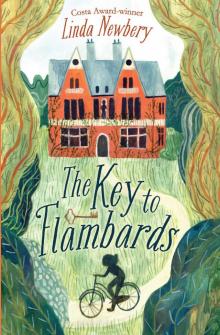 The Key to Flambards
The Key to Flambards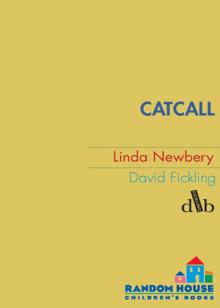 Catcall
Catcall Sisterland
Sisterland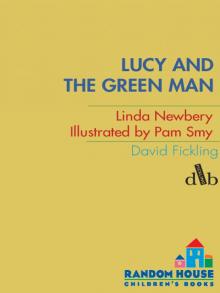 Lucy and the Green Man
Lucy and the Green Man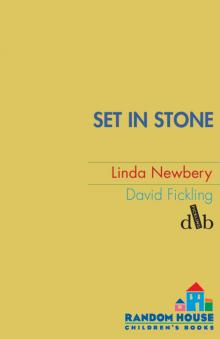 Set In Stone
Set In Stone Lob
Lob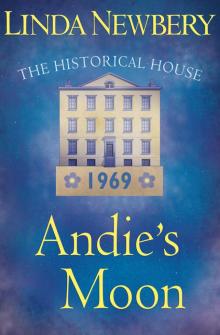 Andie's Moon
Andie's Moon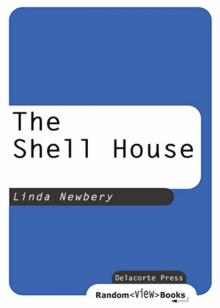 The Shell House
The Shell House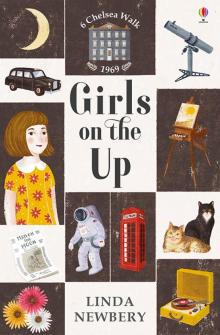 Girls on the Up
Girls on the Up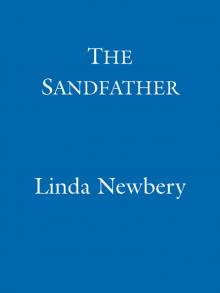 The Sandfather
The Sandfather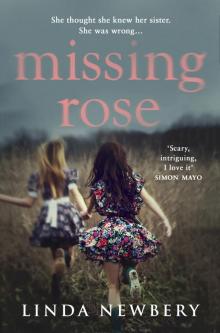 Missing Rose
Missing Rose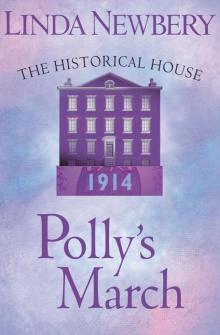 Polly's March
Polly's March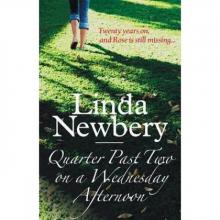 Quarter Past Two on a Wednesday Afternoon
Quarter Past Two on a Wednesday Afternoon Flightsend
Flightsend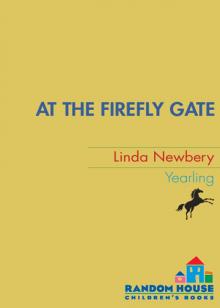 At the Firefly Gate
At the Firefly Gate